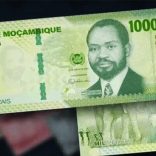Mozambique: Digital data 'oil of 21st century' for economy, social growth - govt
Mozambique: Economists want measures to alleviate inflation for poorest

File photo: Lusa
Two economists from Mozambique, Estrela Charles and Elcídio Bachita, on Friday called for measures with a direct impact on the poorest sections of the population given the rising inflation in the country, warning of the risk of “social breakdown.
“We are in a near collapse in terms of dissatisfaction among the population. With these price rises, we will have a situation of great dissatisfaction, great inequality and great social exclusion,” Estrela Charles, an economist and researcher at the non-governmental organisation (NGO) Centre for Public Integrity (CIP), told Lusa.
Considering the measures put forward by the government to alleviate the impact of price rises “palliative and theoretical”, Charles argued that the universe of social protection should be broadened to include more beneficiaries from vulnerable social classes and the unemployed and that the state-owned public transport sector should be strengthened to apply social tariffs for users who cannot afford to use privately-run public transport.
“The government should focus more on the consumer and not on companies because subsidies to companies do not have a direct impact on the consumer and do not influence the purchasing power and standard of living of the final consumer,” she said.
Estrela Charles emphasised that the government should withdraw resources spent on privileges allocated to the high cadres of the state and channel them into social expenditure through a serious austerity policy.
“The high cadres of the State enjoy subsidies and luxury cars, while civil servants cannot even afford to take public transport,” the economist compared.
Estrela Charles pointed out that the rise in fuel and food prices due to the Russia-Ukraine war had aggravated the trend of rising inflation in Mozambique, given that the African country imports these goods.
At the beginning of the year, she said, “the government was being very optimistic” and “forecast around 5% annual inflation, but in February, there was a tendency for prices to rise, which is worsening with the rise in fuel and food costs and devaluation of the euro.
Economist Elcídio Bachita advocated fiscal measures focusing on taxes and import duties on fuel and food so that the high inflation does not deteriorate the precarious living conditions of the poor.
Although the government tweaked Value Added Tax (VAT) rates to mitigate the impact of the Covid-19 pandemic, “there is still some room for more fiscal relief, at least at the level of food products and in the short term,” he noted.
On the other hand, the central bank should curb the rising interest rates because the current upward trend in inflation does not have a monetary matrix.
Warning that “importing goods and services also means importing inflation,” Bachita called for a focus on national production in areas where the country has potential, particularly agriculture so that Mozambique is not overly exposed to fluctuations in the international markets.
Year-on-year inflation in Mozambique was 10.81% in June, the highest figure for the last four years and nine months, the National Statistics Institute (INE) said.
Year-on-year inflation in May was 9.31% and rose 150 basis points in June, according to the new Consumer Price Index (CPI) bulletin.
You have to go back to August 2017 to find a higher figure: at the time, inflation was 14.13% due to the shock caused by hidden debts.
The rise that has taken place since the start of the year is in line with all forecasts and the global inflationary climate caused by the war in Ukraine and rising fuel prices.
The food, non-alcoholic beverages and transport divisions were the most significant contributors to the increase in prices in Mozambique.













Leave a Reply
Be the First to Comment!
You must be logged in to post a comment.
You must be logged in to post a comment.